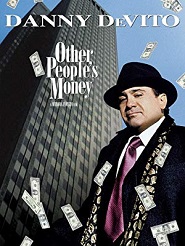
|
American Rhetoric: Movie Speech "Other People's Money" (1991)
Andrew Jorgenson Addresses the Stockholders of New England Wire & Cable Co.
Audio mp3 delivered by Gregory Peck and Dean Jones
President Coles: Could I have your attention please? Welcome to New England Wire & Cable's annual stockholder's meeting. I'm William J. Coles, your President, and I'm sure -- I'm sure that everyone here realizes the most important item on the agenda is the election of the Board of Directors. Now, there are staff members passing out the ballots. Right now, I am very proud to introduce to you a man who could accurately be characterized as a legend in the wire and cable industry. The Chairman of the Board of New England Wire & Cable, Mr. Andrew Jorgenson. Mr. Jorgenson: Well, it's good to see so many familiar faces, so many old friends. Some of ya I haven't seen in years. Well, thank you for coming. Now, Bill Coles, our able President, in the annual report has told you of our year, of what we accomplished, of the need for further improvements, our business goals for next year and the years beyond. I'd like to talk to you about something else. I wanna share with you some of my thoughts concerning the vote that you're gonna make in the company that you own. This proud company, which has survived the death of its founder, numerous recessions, one major depression, and two world wars, is in imminent danger of self-destructing -- on this day, in the town of its birth.
There is the instrument of our destruction.
I want you to look at him in all of his glory, Larry "The Liquidator," the entrepreneur of post-industrial America, playing God with other people's money. The Robber Barons of old at least left something tangible in their wake -- a coal mine, a railroad, banks. This man leaves nothing. He creates nothing. He builds nothing. He runs nothing. And in his wake lies nothing but a blizzard of paper to cover the pain. Oh, if he said, "I know how to run your business better than you," that would be something worth talking about. But he's not saying that. He's saying, "I'm going to kill you because at this particular moment in time, you're worth more dead than alive." Well, maybe that's true, but it is also true that one day this industry will turn. One day when the yen is weaker, the dollar is stronger, or, when we finally begin to rebuild our roads, our bridges, the infrastructure of our country, demand will skyrocket. And when those things happen, we will still be here, stronger because of our ordeal, stronger because we have survived. And the price of our stock will make his offer pale by comparison. God save us if we vote to take his paltry few dollars and run. God save this country if that is truly the wave of the future. We will then have become a nation that makes nothing but hamburgers, creates nothing but lawyers, and sells nothing but tax shelters. And if we are at that point in this country, where we kill something because at the moment it's worth more dead than alive -- well, take a look around. Look at your neighbor. Look at your neighbor. You won't kill him, will you? No. It's called murder and it's illegal. Well, this too is murder -- on a mass scale. Only on Wall Street, they call it "maximizing share-holder value" and they call it "legal." And they substitute dollar bills where a conscience should be. Dammit! A business is worth more than the price of its stock. It's the place where we earn our living, where we meet our friends, dream our dreams. It is, in every sense, the very fabric that binds our society together.
So let us now, at this meeting, say to every Garfield in the land, "Here, we build things. We don't destroy them. Here, we care about more than the price of our stock! Here, we care about people. |
|
© Copyright 2001-Present. |



